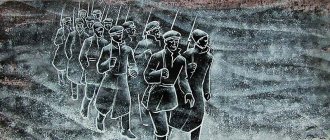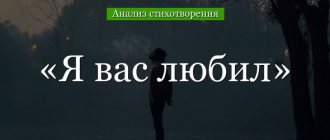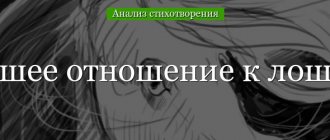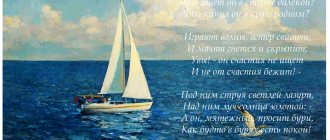“About valor, about exploits, about glory...” Alexander Blok
About valor, about exploits, about glory I forgot on the sorrowful earth, When your face in a simple frame shone on the table in front of me.But the hour came, and you left home. I threw the treasured ring into the night. You gave your destiny to someone else, And I forgot your beautiful face.
The days flew by, spinning like a cursed swarm... Wine and passion tormented my life... And I remembered you in front of the lectern, And I called to you, like my youth...
I called you, but you didn’t look back, I shed tears, but you didn’t condescend. You sadly wrapped yourself in a blue cloak, You left the house on a damp night.
I don’t know where the shelter of your pride is. You, my dear, you, gentle one, have found... I sleep soundly, I dream of your blue cloak, In which you left on a damp night...
No longer dreaming of tenderness, of glory, Everything is over, youth is gone! I removed your face in its simple frame from the table with my own hand.
Analysis of Blok’s poem “About valor, about exploits, about glory...”
Alexander Blok's love lyrics are very controversial and contradictory. Until now, researchers of the poet’s work are trying to understand the complex relationship between the author and his wife Lyubov Mendeleeva, who was Blok’s muse. However, their marriage was not happy, and a few years after the marriage, Mendeleeva left for the poet Alexander Bely. Then she returned, repenting of the mistake she had made, and again started a new affair, from which she gave birth to a son. Blok himself also experienced several romantic interests during this period. The spouses could not see each other for months, since Lyubov Mendeleeva was an actress and often went on tour. But they still remained friends at the insistence of the poet, who believed that spiritual intimacy is much more important than physical intimacy.
However, Blok had a very hard time experiencing problems in his family life. And in 1908, when Lyubov Mendeleeva met Alexander Bely, he wrote his famous poem “About valor, about exploits, about glory...”, in which he spoke about his experiences. And he admitted that he managed to overcome his painful passion for a woman, who, by the will of fate, played a fatal role in the fate of the poet.
It is worth noting that the future spouses knew each other since childhood, as their families were friends. However, when they met years later, they hardly recognized each other. Blok fell madly in love with a 16-year-old beauty who dreamed of becoming an actress. She responded to his advances with complete indifference. By that time, Blok was keen on mysticism and looked for secret signs of fate in any set of circumstances. And then one day, as a student and aspiring poet, he met Mendeleeva on the street, believing that this was not a coincidence. Blok not only convinced himself that he loved this woman, but also infected Mendeleeva herself with an unshakable belief that they were destined to be together. In 1903, the couple got married, but they truly became husband and wife only a year later, since the poet refused to overshadow what he believed was an ideal spiritual union with carnal pleasures.
Indeed, many eyewitnesses recalled that in life Blok treated Mendeleeva not as a wife, but as a muse. And, remembering parting with her, he wrote in his poem that “tears shed, but you did not descend.” The symbol of love for Mendeleeva for the poet was “a face in a simple frame” - a portrait of his wife, which after the wedding always stood on the poet’s table. And this, too, was a kind of symbol to which Blok attached special significance. He was convinced that this particular portrait would help him in his work, without paying any attention to his wife, who could be standing behind him. As a result, the poet states the inevitable: “You sadly wrapped yourself in a blue cloak, you left the house on a damp night.”
It is noteworthy that for the poet Mendeleev’s Love was not only a symbol of spiritual purity, but was also associated with youth. Therefore, the author notes that her departure marked the end of her carefree youth. “Can’t we dream about tenderness, about glory, everything is over, youth is gone?” asks Blok. And he answers to himself that this is really so. The woman whom the poet idolized took with her not only the feeling of lightness and carefreeness inherent in youth, but also inspiration. However, Blok still managed to cope with his feelings, so he wrote: “I removed your face in a simple frame from the table with my own hand.”
The poet could not even imagine that fate would forever connect him with this woman. She left and came back. Blok even agreed to recognize her son as his own child, but at the same time he started affairs on the side. However, until his death he believed that Mendeleev’s Lyubov was a “holy place of the soul.”
For Alexander Blok, love was a separate line in his work. For him, this feeling was comparable to a flash. Dedicating six years of poetry to Lyubov Mendeleeva, Blok idealized his wife. But, when the fire of love went out, the time came to write the poem “About valor, about exploits, about glory.”
When the first delight from the great feeling sank into oblivion, Alexander Blok created the cycle “Retribution”. In it, he did not want to get even with his wife for treason, but condemned himself. All the poems in this cycle are imbued with feelings of exhaustion and spiritual ruin.
The poet thought “about valor, about exploits, about glory” the day before the New Year of 1909. This poem has a real basis - a love triangle between Alexander Blok, Lyubov Dmitrievna and Andrei Bely. The departure of his wife completely devastated the creator; he lost his divine ideal. This was followed by the return of his wife, but the old love did not come with it.
Block: poems about love
The poet wrote a lot about love, with particular sadness. This is an important theme of his work, one of the main ones. Alexander Alexandrovich wrote “Poems about a Beautiful Lady” under the impression of falling in love with Mendeleeva, his future wife. He endowed the earthly creature with unearthly qualities, seeing in her the feminine ideal that he invented for himself.
687 poems were dedicated to Lyubov Dmitrievna. After their wedding, the poet switches to other topics - civil ones. These were the cycles “Iambics” and “Scary World”, as well as “Retribution”, into which love lyrics again broke through. The block “On valor, on exploits, on glory” was included in this cycle. Alexander Alexandrovich always believed in the bright power of love and gave himself completely to it. However, his love was not only romantic. He also loved Russia, his homeland, with all his soul.
Images and symbols
Alexander Blok dedicates his love letter to the portrait. It serves as one of the symbols of the past, but for the poet it is a living, spiritualized image of his beloved. It seems that the whole world is contained in the portrait.
The portrait of Blok’s wife stands on a lectern - a quadrangular table that stands in the church in front of the iconostasis. Also, the sacrament of wedding takes place in front of the lectern. The fact is that the poet compared love with divine light power, and vows of allegiance to it meant everything to him. The image on the lectern is a symbol of the husband’s devotion and the wife’s betrayal.
The central image of the poem is the “cherished ring”, which the lyrical hero throws away. After all, the oath of allegiance has been broken. Even the time of day (night) is also a kind of sign. She acts as the unknown. Another important detail is the blue color of the cloak. In the Middle Ages, it was a symbol of treason.
The lyrical hero talks to a portrait of his, now distant, wife. He hopes that his words will reach his beloved. Her image, not overshadowed by the events of recent years, makes her husband forget about grief, valor and glory.
Themes and mood
The main theme of the poem is disappointment in love. The motive is retribution against himself and his wife, who betrayed the ideals of fidelity. The lyrical hero does not accept such love and decides to leave, closing any memories for himself, including the portrait. The motive of debauchery can also be traced, because wine and corrupt women are the new “family” of the abandoned man.
The main indicator of mood is the already mentioned color. It evokes sadness, melancholy and the bitter aftertaste of betrayal.
Means of artistic expression
Blok's love experiences colored the epithets in the right shade (sorrowful land, treasured ring, damp night, cursed swarm). The image of the heroine is depicted by metaphors (in a simple frame and a blue cloak). Personifications also participate in creating the image (it shone on the table, the days flew by).
In addition, Alexander Blok uses the refrain to enhance the effect of bitterness from parting with the ideal.
Interesting? Save it on your wall!
In the early work of Alexander Alexandrovich Blok, the theme of love was one of the central and burning themes. However, in a later period it gave way to disappointment and longing for lost ideals. This mood of the poet is especially acutely felt in the poem “About valor, about exploits, about glory...”, included in the “Retribution” cycle. Here is a brief analysis of “About valor, about exploits, about glory...” according to a plan that will be useful in preparing students for a literature lesson in the 11th grade.
Genre, direction, size
The direction of the poem “About valor, about exploits, about glory...” and all of Blok’s work is symbolism. The poet uses vivid images and symbols to create the artistic world of the poem.
Genre of the poem: love letter. In it, the lyrical hero addresses his beloved, and the work itself looks like a letter in verse.
The poem “About valor, about exploits, about glory...” is written in iambic pentameter and uses cross rhyme (ABAB).
Brief Analysis
History of creation
– The poem was written in 1908, and was included in a cycle called “Retribution.”
Theme of the poem
- Disappointment in love.
Composition
– Ring composition.
Genre
— A love letter.
Poetic size
– Iambic pentameter with cross rhyme.
Metaphors
-
“when your face is in a simple frame,” “you gave your destiny to someone else,” “I threw the treasured ring into the night.”
Epithets
-
“sorrowful”, “raw”, “damned”.
Personifications
-
“the days flew by,” “wine and passion tormented my life.”
Comparisons
- “
And he called you like his youth.”
Inversion
-
“your cloak is blue”, “she left on a damp night.”
Archaisms
—
“pride”, “lectern”.
History of creation
The main woman in the life of the young poet was Lyubov Dmitrievna Mendeleeva, in whom he saw the embodiment of the female ideal. Over the course of six years, he dedicated almost seven hundred lyric poems to her, written with great love.
It is not surprising that a serious blow for Blok was the betrayal of his beloved woman, whom he had married by that time. Lyubov Dmitrievna left the poet for the sake of his close friend, the poet Andrei Bely. The departure of his wife, whom he had idolized with such trepidation all this time, devastated Alexander Alexandrovich. Having lost his illusions and former ideals, he was morally destroyed, and for a long time he could not recover from the betrayal. Subsequently, Lyubov Dmitrievna returned to her husband, but he no longer felt the same feeling for her.
Deep emotional shock became the reason for the creation of the “Retribution” cycle. However, despite the eloquent title, the author did not try to get even with the traitor for the mental pain caused. The cycle also included the poem “About valor, about exploits, about glory...”, imbued with the poet’s mental anguish and exhaustion.
main idea
The meaning of the poem “About valor, about exploits, about glory...” is that many relationships can end in betrayal and betrayal. The period of accepting that everything finite can be long and painful, a person will “ruin his life,” be tormented by memories of a happy past and idealize his love. There may also be regrets about wasted time. However, at some point the pain will go away, and the former love will be forgotten and will cease to be the main meaning of his life for a person.
The main idea of the poem is overcoming disappointment in love.
Subject
The main theme of the work is disappointment in love. The betrayal and departure of a once so beloved woman leaves a deep wound in the poet’s soul. He is not ready to forgive the betrayal and decides to erase the image of his beloved from his memory forever.
In an attempt to get rid of mental torment, the lyrical hero goes to great lengths. However, neither wine nor other women are able to fill the gap left by the departure of their beloved. The entire poem is permeated with despondency, melancholy and the bitter aftertaste of betrayal.
The hero sees the meaning of life only in love, and no earthly joys can replace the delights of spiritual life. However, strong love does not manifest itself in half measures - it either inspires and lifts to heaven, or completely destroys.
Means of expression
To give greater expressiveness, the author used many symbols in his work, among which there are also traditional Christian symbols
. Thus, the “cherished ring” is a symbol of fidelity, the lectern is a symbol of love and fidelity, the night represents darkness and the unknown, and the blue color of the cloak is treason.
With the help of bright epithets
(“sorrowful”, “cursed”),
personification
(“days flew by”, “wine and passion tormented my life”) and
metaphors
(“you gave your destiny to another”, “I threw the treasured ring into the night”), the poet described the experiences of the lyrical a hero who has lost the meaning of life. He compared love with irretrievably lost youth (“And he called you as if he were his youth”).
Each phrase is filled with deep meaning and symbols that hide the suffering, sadness and despair of the lyrical hero.
Artistic media
There are many epithets in the poem. They are designed to enhance the reader’s perception of the hero’s feelings:
- "on a woeful land";
- "beautiful face";
- "you, gentle one."
If you study the verse more carefully, you can see that its size and focus echoes Pushkin’s famous work “I Remember a Wonderful Moment.” If Blok sees the shining face of his beloved on the table, then Pushkin turns to the object of his love in reality, saying: “...I dreamed of your tender image.”
But despite the similarity of the plot, the endings of the poems are different. If Pushkin preaches the rebirth of the soul, then after reading Blok there remains a touch of bitterness and hopeless despair.
When creating the work, Blok mainly used exact rhymes : “glory is the frame.” But there are also complex consonances: “blue is blue for pride.” This allows us to emphasize the depth of confusion and torment of the lyrical hero.
Great importance is given to internal experiences. The structure of verse and rhyme contains many motives and leitmotifs. Using a poetic meter such as iambic pentameter, the hero’s thoughts about the meaning of existence and the unpredictability of human life are emphasized. No less often, Blok uses precise and thematic parallelisms, as well as anaphora. These techniques emphasize the depth of the spiritual drama.







